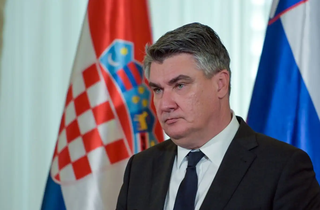During a press briefing, Milanović vehemently criticized the decision of the Constitutional Court, denouncing it as "gangster-like" and asserting, "I will eventually be prime minister, but I won’t tell that gang how."
The ruling came after Milanović called for a parliamentary election on April 17 and subsequently announced his candidacy for Croatia's next prime minister on the opposition Social Democratic Party's list. This unexpected move triggered a political upheaval in the EU and NATO-member country, prompting the intervention of the constitutional court.
Presiding judge Miroslav Separovic clarified at a news conference that if the president wishes to engage in political campaigning, he must promptly submit his resignation to the president of the Constitutional Court. Separovic emphasized that according to the constitution, the president, as a nonpartisan figure, is prohibited from participating in elections or campaigning for any political party.
Milanović's intention to challenge the current conservative prime minister, Andrej Plenković, and his ruling Croatian Democratic Union (HDZ) was met with a constitutional hurdle. The HDZ, which has largely dominated Croatian politics since the country's independence in 1991, has faced accusations of corruption from Milanović.
As Croatia gears up for the parliamentary election, tensions between the opposing factions have intensified, with Milanović's bid for prime ministerial candidacy adding fuel to the political fire.
Despite Croatia's recent accession to the European Union in 2013 and subsequent integration into various European institutions, including the eurozone, political strife continues to shape the country's landscape. Moreover, a presidential election is scheduled to take place later this year, further adding to the political dynamics in the Adriatic Sea nation. (ILKHA)



 Dünya
Dünya
 Güncel
Güncel
 Güncel
Güncel
 Güncel
Güncel
 Güncel
Güncel
 Güncel
Güncel
 Güncel
Güncel
 Güncel
Güncel
 Güncel
Güncel
 Dünya
Dünya





